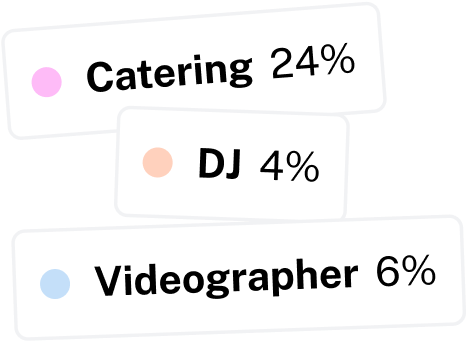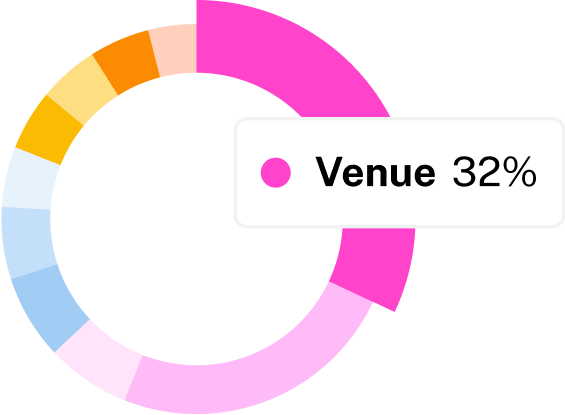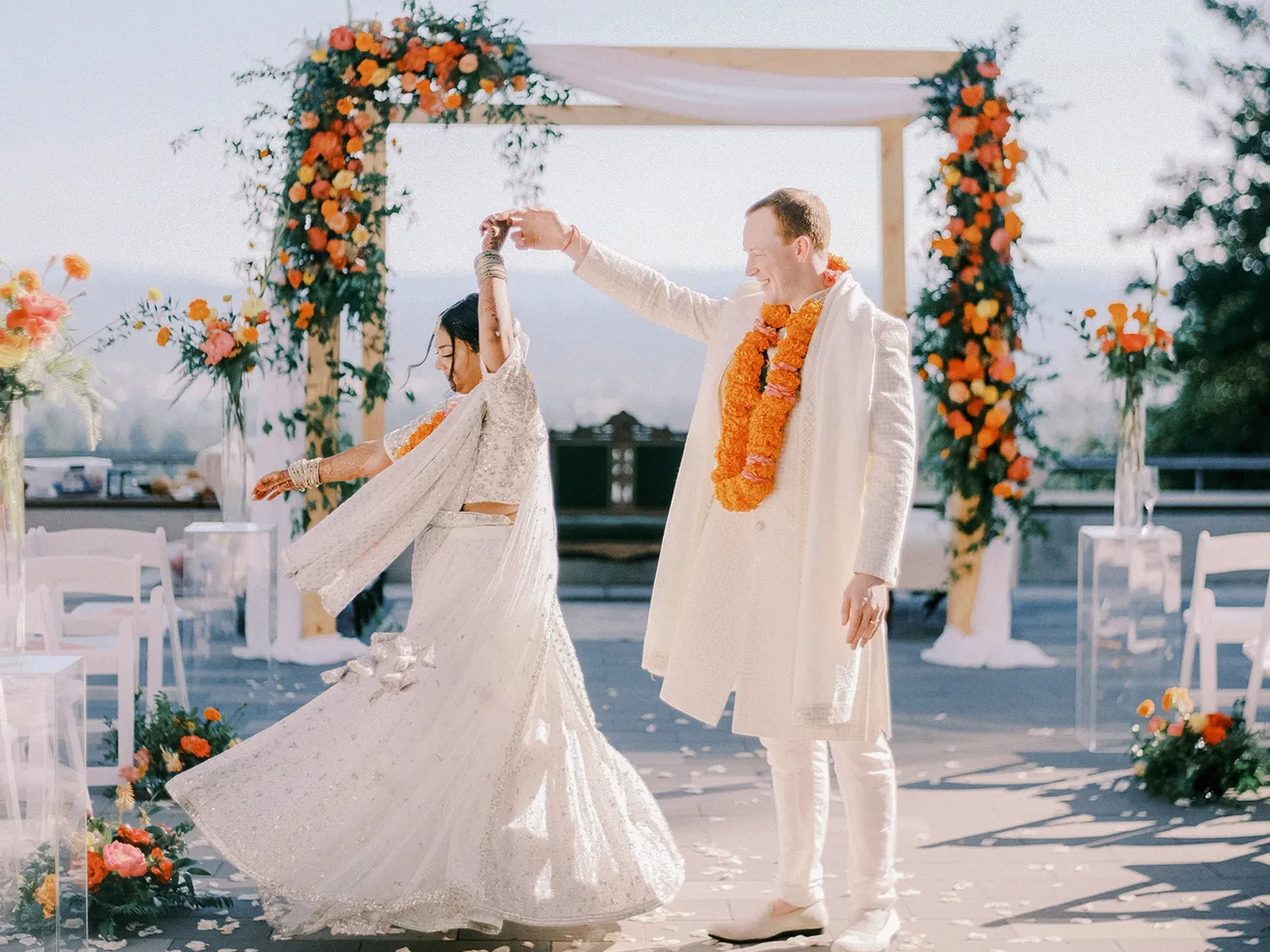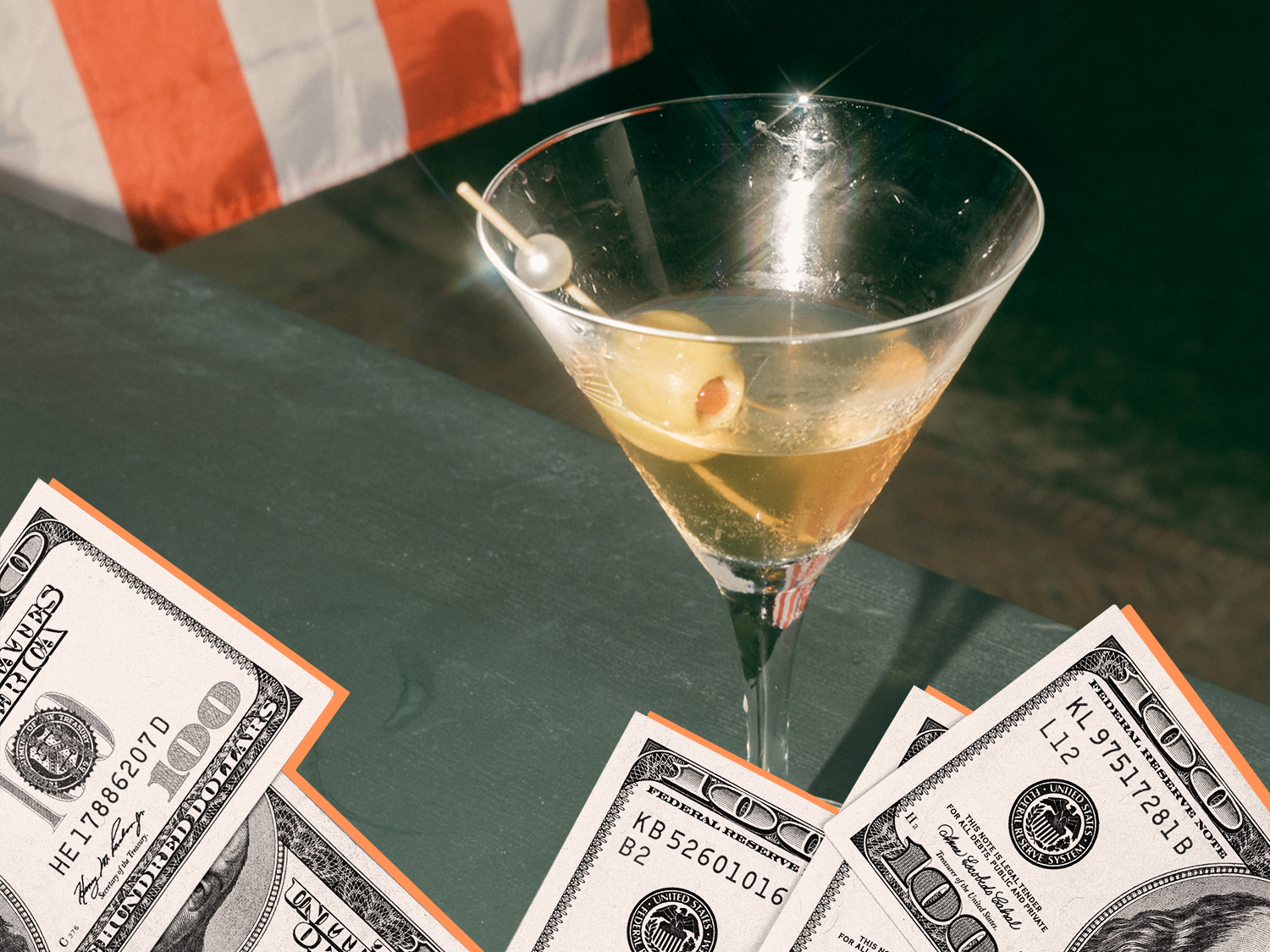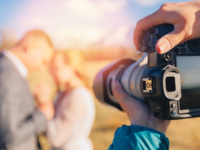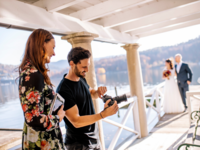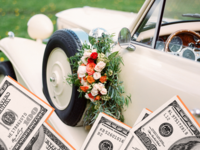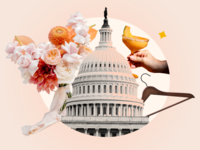Why Are Wedding Photographers So Expensive? We've Got Answers
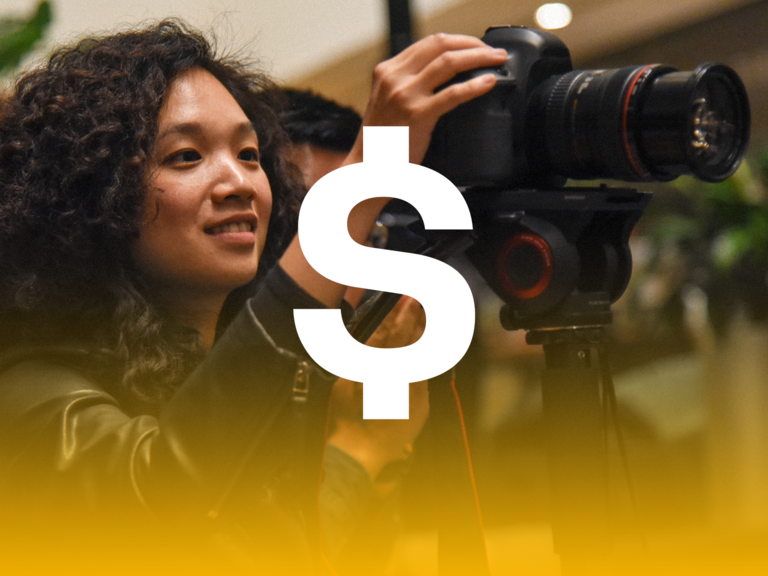
Nothing beats the goosebumps you get as you peruse the portfolio of a talented wedding photographer. You see (and feel) their expert eye, open heart and nuanced perspective—and the results are transportative. If you're in the throes of wedding planning, you might wonder: Why are wedding photographers so expensive? Or even: Why are weddings so expensive? We get it, hashing out your wedding budget comes with tons of sticker shock and could have you questioning what's behind the numbers you see, like the average wedding photographer cost. Rather than going down a research rabbit hole to determine if the wedding tax is real or interrogating wedding photographers directly about their rates, use this guide to learn the why behind their prices.
We chatted with some of the most sought-after shooters in the industry to show you all of the behind-the-scenes learning and labor that contributes to this cost. So, once you find a pro you love on The Knot Vendor Marketplace (you can filter to see the vendors in your area and within your budget), you can keep your questions for wedding photographers respectful and conducive to capturing your celebration authentically. As you go, don't forget how you feel when you see wedding snaps that make your heart swell, that capture love candidly.
Unique Perspective
Every wedding photographer brings a bespoke style and vision to their images, and it's not something that can be easily replicated from photographer to photographer. Broadly put, you wouldn't ask a photographer who shoots light, bright and airy images to capture your nuptials if you want moody shots that look plucked from a noir film. A unique POV is a quality every seasoned wedding photographer has and is definitely something you should account for (and be willing to pay for) as you consider how to choose your wedding photographer.
"My photography style leans documentary—I tend to take a more 'hands-off' approach to a wedding day, while still offering guidance and direction when necessary," says Hope Allison of Hope Allison Photography in Boston, Massachusetts. "My photography is rooted in connection—between you and your partner, your family and friends, and even between you and me. The most amazing photos are taken when you come with open hearts and open minds, and simply lean into who you are."
Years of Experience and Skill
The longer a pro photographs weddings, the keener their eye for capturing special moments. Photographers become more attuned to the nuances that unfold during weddings as they gain experience, and that growth in expertise from boots-on-the-ground experience is included in a photographer's rate. "It has been many years of learning and growing—I'm entering into my 12th year of photographing weddings with over 400 weddings captured," says Nicole Plett, a wedding photographer in New York, New York. "In recent years, I've revolutionized my thought process as to how I value myself, the time that is put into photography and my approach of how I serve the couples I'm fortunate to work with."
Wedding photographers have to be even more nimble than engagement photographers (which is just one reason why the hourly rate for a wedding is pricier than that of an engagement session). They must capture a once-in-a-lifetime event in real time, anticipating special moments, knowing the right angles and seamlessly blend into the background as the celebration unfolds. And that can take years to master.
Formal and Informal Education
Along with years of professional experience, wedding photographers also undergo years of education. This comes by way of formal photography classes, courses and full-on college degrees in the subject, but also from informal education. Many wedding photographers spend countless hours practicing behind the lens, and this time's value should be accounted for in their pricing. For example, Allison mentions a formative 15 years practicing photography in both a school setting and outside the classroom as a personal passion—both were key to help her master the technical side of photography and hone her creative eye.
Kelsey Newkham-Sjostrom is one half of the married duo behind Ruét Photo in Austin, Texas, which shoots documentary-style film and digital imagery. The pro notes that she and her partner, Talon Sjostrom, not only spent time learning the ins and outs of their equipment, but also the general flow and etiquette of weddings. "We've really followed the Malcom Gladwell 'spend 10,000 hours on a subject to become an expert' philosophy in our business," says Newkham-Sjostrom, who has professionally photographed nearly 400 weddings in 14 years. "We've spent many, many hours practicing—from different direction styles, to all film stocks in every lighting scenario we could try, to different artificial lighting techniques, to honing our editing skills required to blend a collection of images photographed on digital and film."
Continued Development
A wedding photographer's education doesn't just stop after a degree or a milestone number of weddings photographed. Many pros will use their earnings toward continuing education courses to keep their skills fresh and adaptable to any wedding-industry photography trends couples request. Additionally, photographers spend countless hours on research and creative conceptualization to refine their visionary eye. "When couples hire a photographer, they're paying for experience and creativity," says Allison. "These things are intangible, though—they're not a product or a service people provide, like an album or an engagement session, but they're valuable nonetheless. Lots of people can use a camera, but it takes years (sometimes decades) to truly develop a unique vision. Honestly, I feel like every time I pick up my camera I'm still trying to grow as an artist."
General Business Needs
Newkham-Sjostrom notes that in addition to constantly refining her photography skills, she and her husband also have to market their services and handle the business side of their job. "We've read countless books and taken countless courses on everything from reading body language, to film scanning, to taxes, pricing and proposals, copywriting, customer service, marketing etc.," says the pro. "Not only is there an endless well of topics to learn about the literal art of photography, but you also spend many hours learning how to run a profitable business that serves your clients well, and also how to present and market that business so said clients can find you. It truly is a never-ending journey."
The Curation of a Bespoke Vision
Yes, photographers work to stay abreast of any of-the-moment photography styles that crop up on social media, but as true creative professionals, they also have the raw talent and perspective to tailor each and every individual shoot to suit their couples by sourcing inspiration from unique places. "I believe an unseen aspect of powerful wedding photography is the work it takes to find inspiration outside of the wedding ecosystem," says Plett, who notes that a significant part of her work is meditating on imagery to decipher what's powerful and what speaks to her. "It can be easy to mirror what we see on social media and what's continually fed back to us because it's trending. I believe creating uniquely fueled work that truly reflects the client, not just what's popular at this current moment on Pinterest, takes a great deal of mental exercise and should not go unnoticed."
Months of Communication and Coordination
If you're still wondering why wedding photographers are so expensive, remember the additional hours they spend ahead of the wedding fielding bookings and coordinating with high-touch clients. There's the initial consultation call, numerous emails back and forth, vendor recommendations and more well ahead of the celebration, as well as a final timeline call closer to the wedding. Newkham-Sjostrom mentions that a venue walkthrough alongside the wedding planner is also sometimes necessary to determine the best photo schedule for the day. "We're also ordering film for the wedding and/or hiring a third photographer if the schedule is really intense," she says. "In the days leading up to the wedding, we're preparing our team and getting the logistics together, as well as cleaning and packing up our gear."
This up-front communication can't quite be billed the same way shooting hours can, but a wedding photographer's overall income still needs to cover this extra labor to stay in business. "People love to say things like, 'All you do is show up and press a button,' but of course that's only maybe 20% of my job as a wedding photographer," says Allison. "Outside of the wedding day itself, I typically work with my clients for 12-18 months leading up to the event. During that time, we exchange innumerable emails, we meet for an engagement session, I help them create their timeline and give them general planning advice…For me, the lead up to the wedding is (almost) as important as the day itself—it allows me to get to know my clients in a deep way and I'm able to share my expertise and guide them through this experience."
Knowledge to Navigate a Wedding
Weddings have many more moving parts than a typical portrait session, and wedding photographers are seasoned experts. Newkham-Sjostrom and her team arrive early to scout out each and every location for the day before snapping shots anywhere from eight to 14 hours to capture the wedding. For destination weddings, that level of effort triples.
"A good photographer should be able to do more than just take a good photograph—they should be able to help you feel comfortable and at ease, and be able to wrangle your family members into a group photo," says Allison. "As the wedding photographer John Dolan said, 'The role of photographer requires versatility—court jester, cat herder, bride whisperer.'
While your family friend might be able to take a good picture on their DSLR, a professional wedding photographer can navigate the timeline, bustle your dress, anticipate emotions and make art under pressure. I promise you it's worth the money to hire a pro."
Transportation
Many wedding photographers will require an additional travel fee if they're shooting nuptials outside their designated service area, but even if every wedding they work in a year is in their specified locational range, things still add up. These mile ranges are usually quite generous, so these pros must account for gas or rideshare costs (it's nearly impossible to lug heavy camera equipment on public transportation). Some locations might require an extra visit from the photographer ahead of the celebration to scope out natural light, architecture and other important specs that would influence a couple's photos.
Equipment Maintenance and Materials Costs
Cameras and equipment are, of course, a significant up-front cost for photographers, but their income also must account for purchasing batteries, hard drives, special software as well as repairing or replacing damaged or broken tech. Also, with the move toward styles like film photography in recent years, materials costs are higher than ever. "In my case, a major expense is the cost of film," says Allison. "Of course I factor that cost into my package pricing, but I think couples sometimes don't realize just how expensive it is (I often will shoot $500 to $1,000 worth of it at a wedding)." Newkham-Sjostrom concurs: "Each frame costs about $6, between purchasing film and developing," she says. "We spend a fortune on memory cards and hard drives—our image backup systems cost hundreds and, sometimes, thousands of dollars each year."
Limited Seasonality
Cresting in early autumn in recent years, peak wedding season roughly spans from June through October. Approximately 67% of couples said "I do" during this time in 2023, according to The Knot 2023 Real Weddings Study. Given this short time span, a wedding photographer's income is highly dependent on seasonality. For nearly half of the year, bookings are slow. And during the busy season, there are only a limited number of weekends to carry full-time photographers through that slow season. If you're looking for affordable wedding photography, prices might be lower in the off season as an impetus for clients to book, helping photographers stay afloat.
Photo Post-Processing Time and Skillset
Depending on the size, scale and span of the wedding, our three experts will spend anywhere from 10 to 60 hours culling shots, editing images, completing first and second pass throughs, mailing film off to a development lab (if applicable) and more. "For me, taking a photograph is only half the battle," says Allison. "Post-processing is the other half of my creative process, when I can truly make a photo into what I envisioned when I pressed the shutter."
The Ability to Make Couples Comfortable
Photographing couples goes beyond just helping the pair find a natural pose (though, that's part of it too). It takes profound tenderness, empathy and emotional energy. "I communicate with the couples I work with that my approach is largely based on observation," says Plett. "To be able to walk into a wedding with an open heart and observe—and therefore absorb—the energy of the day is a beautiful, but large feat. When investing in someone who takes this approach, you are investing in the greatest gift we have to offer; our time and our ability to be fully present with you."
Newkham-Sjostrom also closely observes how her couples interact to sense their unique energy. "I tap into my intuition and my empathy to gauge how they may be feeling and tweak my approach," she says. "We try to get to know each couple as much as possible by chatting with them and, most importantly, listening to what their priorities are…I like to think of it as a dance with each couple. I'm learning about their love as I'm photographing them."
Your Investment in Art
Remember: Wedding photographers are artists—artists that we're lucky to access. Commissioning a photographer for your wedding is akin to commissioning a painter for a custom work. "Investing in a beautiful piece of artwork goes beyond purchasing something from someone who's capable of putting paint on canvas—it's about seeing their work, valuing their unique perspective, efforts and investment into developing their own point of view," says Plett. "Your investment extends beyond the traceable hours of their physical presence on your wedding day, but into the life they have built around the act of creating and capturing beauty."


